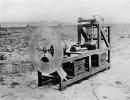Teaching English from the age of 3. Summary of an English lesson for young children (2-3 years old) "My toys
How earlier child starts learning a foreign language, the better he will learn it. This principle was also guided by our early development school, creating English language courses for children 3-4 years old. Lessons are conducted in small groups or individually, in our office or at your home.
As a preparation for learning for children from 2 years of age, individual lessons are organized at home, in the ILA office or in one of the departments of our kindergarten.
English lessons for toddlers are held 2 times a week.
The cost of classes is 15,000 rubles per month.

English course program for children 3 and 4 years old
The program is adapted for the age of young listeners and includes blocks of:
- sensorics;
- English language;
- English literature;
- music;
- art and artistic work.
In the classroom, it is actively expanding vocabulary kids on the following topics: counting to 10, colors, toys, animals, vegetables and fruits, food, weather, holidays, household items, etc.
We run English lessons for toddlers 2 times a week. Each lesson is divided into 3 blocks of 20 minutes. This is the optimal duration of classes for children 3-4 years old according to the recommendations of the Ministry of Health.
Lesson structure
Children from 3 years of age attend English language courses, so the training is carried out in a fun way. Each block is divided into three stages:
- Warming up: Before learning English, children jump, squat, clap their hands and, thus, mentally tune in to learning.
- Material presentation: children learn new words using simple or role-playing games (for example, hide and seek, daughters and mothers), singing songs and nursery rhymes, using bright cards and illustrations, singing songs, etc.
- Practice, interesting tasks to fix the material: cartoons, books, small performances, drawing, playing with objects, etc.
After completing the lesson, the school teacher gives the parents homework for babies.
Benefits of English for Children at the Academy
- Lessons are taught by professional teachers specializing in teaching children 3 and 4 years old. School teachers are always open to communication with the parents of the kids, ready to talk about the child's progress in learning English.
- Throughout the lessons, teachers speak English: the child guesses the meaning of a word from a picture or other didactic material... This speeds up language learning.
- The methods used, including interactive ones, allow children from 3 years old to practice without physical and emotional fatigue. The loads are in accordance with the recommendation of doctors.
- Guaranteed result. By the end of the course, the child will learn to understand the teacher's requests, will be able to say hello and say goodbye to people, and will be able to explain what he likes and what does not.
English for kids 2-3 and 3-4 years old will help a child to master a foreign language as a native language without cramming and stress. Training in courses from 2 years old is possible only individually.
Today I want to tell you about how to teach English to your little children, starting from 3 years old. You may be surprised and even indignant:
- How?! To deprive your own child of childhood and the opportunity to play once again from such an early age?
- Yes, such a baby is simply incapable of taking up another language so early, because she still does not know her native language well!
And here's what I tell you, dear adults:
You are too cruel to your own children! Ask why?
- As adults, transfer your sluggishness and laziness to your baby: try to teach you something now, when it is more pleasant for you to look at the "box", eat deliciously, sleep, drink beer, gossip. Unlike you, your child is curious, he does not like to eat and sleep, he loves to learn!
- You deprive the child of the opportunities that nature gave him: it is from 3 to 5 that children have the most tenacious memory, and during this period he assimilates more information than later in his entire life.
Three-year-olds are very curious. It only seems to you that the kid, who is busy in the sandbox, hears nothing. One fine day, like a parrot, he suddenly gives out the entire stock of necessary and unnecessary words, which he absorbed like a sponge during games and other serious children's affairs.
Children's language abilities
This is the property of children - to remember, playing and, it would seem, not hearing anyone, must be used. You need to turn your first English lessons into the same game:
- the child is simply interested in playing with you, he does not know that you, it turns out, are teaching him;
- focused on the game itself, in between times he will remember everything English phrases told to him.
 Start learning with the name of everything that surrounds your baby at 3 years old:
Start learning with the name of everything that surrounds your baby at 3 years old:
- household items - toy (toy), plate (plate), table (table), apple (apple), etc.;
- parts of the body - hand (hand), nose (nose), mouth (mouth), head (head), eyes (eyes);
- what he sees on the street is a car (car), a cat (cat), a bird (bird), the sun (sun).
Learn not only words, but immediately make up simple phrases from them:
- Give me a cup, please
- Do you want an apple? - You want an apple?
- Let's go for a walk! - Go for a walk!
Learning foreign languages trains memory, broadens a person's horizons, gives him more opportunities in further learning, career advancement, opens doors for him previously inaccessible. Many parents, taking care of the prosperous future of their child, insist on learning a foreign language from an early age, priority is given to learning English, since it is recognized internationally.
English for children, namely, the curriculum differs depending on the age at which the baby started the classes.
As you know, babies are easy to learn, it is easier for them to remember the pronunciation or meaning of words, since the brain assimilates the information received much better than older people. It is possible to introduce a baby to learning foreign languages from birth, for this there are many special programs and methods, but as practice shows, children growing up in a bilingual environment begin to speak later than their peers.
The optimal period when you can conduct the first English lessons for children is 3-4 years. It is at this age that children already know their native language thoroughly, and being in the stage of why, they are ready to absorb any information and are happy to start learning, if only it was fun.
English for children from 3 years old
At three years old, children know how to speak, but most of all, it turns out, they ask questions, so if you decide to study foreign languages, English in particular, build your English lessons for children in the form of a game where the kid asks questions in Russian, and the answer hears with translation. You cannot overload 3 year old fidgets with letters, transcription and verbs, they will study all this after they go to school, and first you need to replenish the active and passive vocabulary.
Every day you need to replenish the stock with at least one new word, you can do it thematically, for example, you learn colors in English for one week, it will be more accessible for children if you devote the whole day to this color. For example, while learning about yellow, put a yellow scarf on your kid for a walk, then look for yellow items on the street, exclaiming “yellow” when you see a yellow car, sign, or flower. In such games, you need to give in to the baby a little, pushing him and provoking him. Well, the prize for the winner can be a yellow delicacy - a banana, lemon ice cream or marmalade. And so all week, then you can study animals, plants, vegetables, fruits, food. When learning a language from cards and pictures, you do not need to translate words just by pointing to the picture, call it in English, so the baby will learn to think, and will not be distracted by translating the word in his mind.
English for children 3-4 years old will be much more exciting if you arrange quizzes and games, for example, if the names of toys and animals have already appeared in the vocabulary of the crumbs, you can collect numerous items in a bag and, taking out one by one, ask the baby what it is. You can also arrange toys and objects throughout the house and ask them to bring something, naming this item in English.
English for children 3 years old will be easier to remember if the entire learning process is built in a playful way, and is also based on the natural curiosity of the crumbs.
English for children 5 - 6 years old
At this age, children are more assiduous and can already move on to the next stage of education, having learned the English alphabet, it will still be more interesting for children to study letters, focusing on pictures, provided that all the words in these pictures are known to them in translation. One of the common mistakes parents make when learning the alphabet is the wrong choice of cards with letters, where the images are misleading, or the wrong approach when the baby, having no vocabulary, starts by learning the alphabet. It doesn't matter at what age to start learning a foreign language, at 3, 7 or at 13, the method is the same, first children learn to listen, then speak, read, and then write.

Children 5 - 6 years old also grasp everything on the fly, therefore, when learning foreign languages, it is necessary to memorize the pronunciation correctly from the beginning. In the event that the parents are not native speakers, it will be better if the kids attend special English courses for children, where, with the help of games and communication, they very quickly memorize the pronunciation and meaning of words, and also learn to build sentences from several words.
Good results are obtained by watching special educational cartoons, programs and programs for an audience of this age. You can also find computer games, whose task is to develop logic and consolidate knowledge in a foreign language. For better pronunciation, you can learn simple poems or songs in which words and actions can be pronounced and accompanied by gestures.
At this age, kids love praise, so for an additional incentive, you can come up with various prizes, chips and certificates.
English for children 7 - 8 years old
Learning foreign languages by children, junior school age can be carried out by school curriculum, but as practice shows, children need a special approach, and the school cannot give great knowledge of foreign languages, because it gets boring during such lessons. In the event that the kid is behind the program, English lessons generally lose their meaning for him.
Before teaching a child to read in English, an elementary vocabulary is needed so that the child not only pronounces sounds and letters, but also understands the meaning of what was said. Cards will also help, as in the case of the alphabet, where there is a drawing on one side, and its name, written in a foreign language, on the other.
Books in English for children should also be transcribed in order to be able to initially correctly read the word and memorize not only its spelling, but also the sound. In order for children to learn to think in a foreign language, it is necessary to ask them riddles and puzzles. So, for example, you can characterize an object in English, describe the size, color, what to relate to, and the student must guess, there is already a motivation for learning, because if children do not understand leading questions or descriptions, they cannot guess the hidden word.
English for children: Meow Meow
Children's club for kids from 3 years old- these are the most favorable conditions for socialization, obtaining and forming a variety of knowledge and skills.
We know how difficult it is often given little child leaving the family in the world of communication. All conditions for soft adaptation are created in our classes. Despite their small age, children withstand the whole day of classes, with an intensive shift. But due to the fact that all English classes for children 3-4 years old are played in a playful way, accompanied by bright, cheerful moments, a positive mood, they feel a positive attitude, comfortable communication, which is very important in teaching children early age.
Age from 3-4 years old is ideal for the development of a baby's speech (including foreign) and for teaching counting from 1 to 10, studying the basics of ethics and aesthetics, for the development of logical thinking, memory and fine motor skills. Particular attention is paid to the reading of poems, fairy tales, the study of songs in English, the study of letters, numbers, shapes and sizes. The result is obvious - by the end of the year, children understand tasks in English, have a fairly large active vocabulary and even make small sentences in English.

Children aged 3 to 4 continue to master them the world and study it little by little. Possessing a sufficient vocabulary and concepts, they can begin to translate the knowledge gained into a foreign language. Learning English for children 3-4 years old requires perseverance and concentration. But at this age it is extremely difficult to get them to focus. Therefore, it is very important to find an approach to language learning through fun games.

At this time, children begin to learn:
- Animal names;
- Simple verbs;
- Item names;
- Colors;
- Seasons;
- Geometric figures.
Benefits of our program
Using the method of full immersion in the language environment - what is the best method for learning a foreign language. Each child will feel comfortable in their own age group, with a personal teacher and assistant. Using an individual approach, we try to take into account all the features of the baby, and achieve high results with him.
5 GREEN teachers, when learning English for children 3-4 years old, take into account the peculiarities of their age and the proper level of development. They help children connect with their peers. And with the help of special techniques, they instill a love for the English language. They also broaden children's horizons and contribute to the study of the world around them. The specialists of our English children's development club understand how important motivation is for children. At the same time, constant beliefs that learning a foreign language will help a child in the future do not bother him in any way at this age. And working with children, first of all, we ask ourselves the question of how we can create interest in learning English child at 3-4 years old and support him? And we know the answer to it. Games allow kids to learn a foreign language easily.
Without knowledge of foreign languages in modern world hard to get by. Therefore, many parents begin to teach the baby English almost from the cradle. How justified is this desire? At what age is it better to start classes? Much in this important matter depends on the methodology and approach to teaching.
Benefits of learning English early
There is no unequivocal opinion about whether it is possible to study a foreign language from the age of 3. There are enough both opponents of this idea and its supporters in the world.
Their arguments are sometimes contradictory.
| Supporters | Opponents |
| At 3 years old, the baby actively learns the world and like a sponge absorbs any knowledge, including a foreign language | In the kid's head confusion of words occurs of 2 languages, and it is difficult for him to accurately express his thought |
| By this age, the child has a sufficient vocabulary of words in his native language. Remains duplicate their sound in English | Due to the different pronunciation of letters in Russian and English, the baby speech therapy problems arise |
| A three-year-old has no fear of making a mistake and seems stupid, that is, he has there is no language barrier | Baby first must know the native language well, and only then learn a foreign language |
| Toddlers have better linguistic flexibility than adults | Learning English early deprives the child of childhood |
| At 3 years old, the child's brain is actively developing, which makes learning a foreign language easy | Simultaneous study of two languages reduces intellectual level baby |
| Knowledge of a second language has a positive effect on knowledge of the family and general mental development- thinking, memory, imagination, attention | Bilingualism is a mixture of two cultures. Child will not fully learn any of them |
| In children an adequate reaction appears earlier for various life situations | Children learning 2 languages have split personality |
| In babies with early bilingualism (the ability to speak two languages) nervous system more stable, they are more contact, it is easier to achieve their goals |
Domestic (S. I. Rubinstein, L. S. Vygotsky) or foreign (T. Eliot, W. Penfield, B. White and many others) psychologists are unanimous in the opinion that it is useless to study a foreign language up to 3 years, and after 10 is meaningless.
Let's listen to the opinion of scientists and start learning English as soon as the baby turns 3 years old.
What you need to know when starting classes
Before starting to study English at home, parents need to prepare themselves and take into account some of the nuances
- You need to start classes on the condition that you can do them regularly, and not from time to time.
- If you are not fluent in English, take the time to polish your pronunciation before class. When a child, repeating after you, will pronounce the words incorrectly, then it will be difficult for him to retrain at school.
- Before teaching the baby, familiarize yourself with the existing methods, choose the one that, in your opinion, will suit your baby best.
- Language learning should be carried out in a fun, playful way. Tedious cramming of English words will discourage the little fidget from repeating English words.
How to teach your toddler English. Methods and techniques
When teaching crumbs, you need to use everything possible ways introduction to English
- Special techniques.
- Audio and video recordings.
- Children's programs for teaching English.
- Games.
- Interesting books and special cards.
The key to success when teaching English at home is that all classes are conducted in an easy playful way, without coercion and prodding from adults.
The more interesting you will present the baby required material, so with great interest he will learn new things.
For home schooling, 3 popular methods are most often used.
Play technique
The name already speaks for itself. This method of learning a foreign language is the most effective, since it does not look like a special occupation that requires perseverance.
The kid receives the necessary knowledge in the process of playing or communicating with parents and assimilates information without noticing it.
The use of the play method contributes to an affordable way of mastering knowledge
- Creation of the baby's readiness for verbal communication (including in a foreign language).
- During the game, the kid has a need for multiple repetition of certain phrases, so English words are easy for them to remember.
- Learning in the process of play occurs through the kid's own actions, which are a kind of practice. As a result, up to 90% of the information is assimilated.
- In any game there is a certain mystery (not received an answer to a particular question), which stimulates the child's mental activity, pushing him to search for the correct answer.
They start learning with the simplest objects and toys. The kid will easily remember that "dog" is a dog, and "cat" is a cat.
Replenish your baby's vocabulary every day. When talking with a baby, pronounce the words already known to him in English. Immersion in the language environment, when the baby hears every day English speech, is the key to successful learning.

To study and consolidate information, you need to use all the methods available and understandable to the child.
Here are just a few examples.
| Teaching materials | Description | Content | Reviews |
| The book “My first words. English". Contains 15 picture books by different topics... Clover Publishing House. | The magic box contains 15 colorful baby books. The words are written in Russian and English.
Dice books develop oral speech, memory and help to know the world. |
2. Vegetables 3. Pets 4. Toys 5. Nature 6. Marine animals 7. Colors 8. Animals 9. Account 10. Birds 11. Clothes 12. Flowers 13. Insects 14. Weather 15. Forms. |
Great idea, information is presented in a colorful, understandable to the kid, form. Small books will not only help you remember words, but also contribute to the development of fine motor skills. |
| Book: We're Going on a Bear Hunt
Michael Rosen. Helen Oxenbury. |
In addition to the book, there is video on You Tub. | A funny story about how dad and the kids went in search of a bear. | The book is very lively and bright. And if you watch the video, where the author reads very funny and exciting, you will understand how fun it is to convey the content to the kid. |
| Book "We play, learn, master - we want to know English." | A book for parents who want to teach their baby English. | Educational stories, each of which includes English words. All lessons have fascinating songs, rhymes, puzzles. | The book was published only this year, reviews have not yet been found. |
| Cartoon Lessons of Aunt Owl. The English alphabet for children. " | Auntie Owl captivatingly talks about each letter of the alphabet and the words that begin with them. | An excellent educational cartoon. Your kids, if they are still unfamiliar with Aunt Owl, will definitely make friends with her. | |
| Cartoon "Teddy the Engineer". | A fun video course of English for toddlers. Simple songs are easy to understand and remember. | Teddy is just a great hero, great music. My baby asks to put on a cartoon several times a day and has already learned the first English words. |


The Carousel TV channel broadcasts an educational program for children "Funny English" ... The kids just can't be taken off the screen at this time. The training takes place in the form of a game that grabs the attention of the baby from the first seconds.
The presenter uses a visual, auditory and sound way of conveying information for memorization. Kids learn their lessons very quickly and after a few programs they surprise adults with their knowledge.
N. Zaitsev's method
Many mothers are familiar with Zaitsev's methods of teaching reading and counting. When studying English, he uses the same technique, only Latin letters are written on the cubes and cards.

You can memorize the alphabet and learn a certain number of English words using the play method with the baby. Zaitsev's cubes help the child to master the English grammar in an accessible form.
However, at the age of three, it is difficult for a baby to learn the rules for constructing a sentence in English. Therefore, it is better to use Zaitsev's cubes and tables when the child grows up a little. Usually, classes begin at the age of 5.
Glen Doman's method
Young mothers try to use the most modern or popular methods for the upbringing and education of the baby, including the Doman method, which has long been known and successful in the West. Undoubtedly, he has proven himself well and raised more than one generation of kids. But, if you take a closer look at the methodology, we will see that it combines the game form of learning English and the Zaitsev method, that is, books, cartoons, plus cards.

Conclusion: in order for a child to quickly master a new science, you need not force him to study, but build them so that the child himself wants to learn. When the baby learns the first foreign words, speak English with him as often as possible - on a walk, before bed, or while swimming. Do not forget to encourage the crumb and praise for the results achieved.
Didactic material for learning English with kids
















